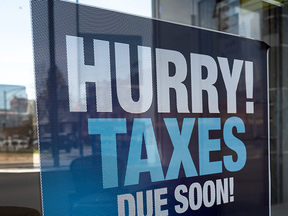Jaime Golombek: Missing the deadline can be a costly mistake if you owe money
Reviews and recommendations are unbiased and products are independently selected. Postmedia may earn an affiliate commission from purchases made through links on this page.
Article content
Millions of Canadians will soon be scrambling to get their returns filed by the April 30 deadline to avoid a potential late-filing penalty and arrears interest.
The Canada Revenue Agency said that as of April 22, it has received 20.7 million 2023 tax returns of the estimated 30.3 million (based on last year’s stats) expected to be filed this season. That means nearly 10 million of us have yet to file.
Advertisement 2
Article content
Article content
Around 71 per cent of those who have not yet filed do plan to do so before the April 30 deadline, according to a new survey commissioned by H&R Block Canada, but a whopping 25 per cent say they’ll miss the deadline entirely.
“We’re seeing an increase in delayed filing this year, and many who anticipate they will miss the filing deadline altogether,” Yannick Lemay, a tax expert at H&R Block Canada, said. “We know that for some people, the fear of owing money is a big contributing factor.”
But missing the deadline can be a costly mistake if you owe money. If you’re late filing your return, you could be hit with a late-filing penalty of five per cent of your balance owing, plus one per cent of the balance owing for each month your return is late, to a maximum of 12 months.
If it’s not the first time you have filed late and you’ve been assessed a late-filing penalty in any of the prior three years, the penalties can double to 10 per cent of the unpaid amount, plus a two per cent penalty for each late month, to a maximum of 20 months.
Add to this the non-deductible arrears interest, compounded daily, charged at the current rate of 10 per cent (decreasing to nine per cent, as of July 1, 2024), and it’s really worth finding some time to file (and, ideally, pay any tax owing) by the deadline.
Article content
Advertisement 3
Article content
Of those who have already filed, 94.5 per cent have chosen to file electronically. Of the 19.5 million returns processed by the CRA so far, 62 per cent of them claimed a refund, with the average refund being $2,126, approximately one in five taxpayers owed money, and the rest filed a nil return.
Almost half of Canadians see refunds as a sign of good tax planning, especially gen-Zers (71 per cent) followed by millennials (58 per cent), according to the recent CIBC tax season poll conducted by Maru Group Ltd., which surveyed a random selection of Canadian adults in early April 2024.
Asked what they were going to do with their refunds, 43 per cent said they will pay everyday expenses, a third will repay debt, a quarter will contribute towards retirement savings and 18 per cent will go on a vacation.
Of course, regular readers will know that I’m not a big fan of tax refunds because it means the government has held onto your money for a year (or more). If your refund is related to large deductions or credits, such as registered retirement savings plan (RRSP) contributions, charitable donations, deductible child-care expenses, spousal support or deductible interest expenses, now is the time to apply to the CRA for reduced withholdings at source for 2024, using CRA Form T1213. That way, you can effectively get your refund throughout the year, instead of waiting until you file your 2024 return in April 2025.
Advertisement 4
Article content
Similarly, tax season itself is hardly the time to realize any significant tax savings. After all, other than perhaps pooling a couple’s charitable donations on one return (due to the lower credit threshold of $200 federally) and choosing to split pension income (where applicable), you can’t save much tax when filing your return.
True tax savings, and opportunities, arise throughout the year. This is confirmed by IG Wealth Management’s annual tax study, which said 57 per cent of Canadians appreciate the importance of year-round tax planning, even though only 27 per cent prioritize it. The study, conducted in partnership with Pollara Strategic Insights, said just one-third of Canadians are “very confident” that they’re taking advantage of all the possible tax breaks.
“Canadians can benefit from year-round tax planning that ideally should be wrapped into their overall financial plan,” Damon Murchison, chief executive at IG Wealth Management, said in a press release accompanying the poll results. “Prioritizing tax planning outside of tax season alone can help lessen your tax bill, maximize available tax credits and deductions and, ultimately, allow you to build and keep more of your wealth.”
Advertisement 5
Article content
With the changes announced in last week’s federal budget to the capital gains inclusion rate, planning ahead will be more important in 2024 than ever before.
“Nobody was expecting that this would happen,” said Chris Anderson, a tax partner with Davies LLP in Toronto, who has received a large number of calls since the budget announced an increase to the capital gains inclusion rate to 66.7 per cent from 50 per cent for gains realized on or after June 25, 2024. “I think pretty much all of my clients have called me about (the budget changes) over the last eight days.”
Taxpayers have, however, been given a rare window of opportunity to take action before the tax hike takes effect by realizing capital gains by June 25, 2024, at the current 50 per cent inclusion rate. While each situation is different, Anderson suggests you’re usually better off to trigger the capital gain now and pay tax at the lower inclusion rate if you don’t expect the property will increase more than 50 per cent from where it is today to when you would have alternately sold it.
Recommended from Editorial
-

Here’s what you need to know about the increased capital gains tax
-

You’d better be working from home to claim home-office expenses
-

CRA reverses course, exempts bare trusts from new regulations
Advertisement 6
Article content
For clients with vacation properties, such as a cottage or cabin, with a significant accrued gain, Anderson said they could think about transferring that vacation property to a family trust. This would trigger the capital gains tax today at the lower 50 per cent inclusion rate. The downside, of course, is that you need to come up with the cash to pay the tax by next year’s April 30 filing deadline.
Jamie Golombek, FCPA, FCA, CFP, CLU, TEP, is the managing director, Tax & Estate Planning with CIBC Private Wealth in Toronto. Jamie.Golombek@cibc.com.
If you liked this story, sign up for more in the FP Investor newsletter.
Bookmark our website and support our journalism: Don’t miss the business news you need to know — add financialpost.com to your bookmarks and sign up for our newsletters here.
Article content























Discussion about this post